The Thesis Whisperer had a guest post this week with the headline Why writing from day one is nuts .* The suggestion that writing early isn’t a good idea runs directly counter to a great deal of thesis writing advice (including that given in this blog). The post, written by James Hayton (who blogs at The Three Month Thesis ), posits that writing from the get-go is unproductive. Hayton argues that writing done early isn’t useful because the writer will struggle to know what to say, will produce weak writing, and will end up with a morass of text that will be hard to transform into something usable. He also claims that early writing can be an ill-advised attempt to impress, but I think this is more a personal experience than a general problem. Finally, he talks about the danger of too much writing—and, yes, I did find that a difficult phrase to type!—because writing without an immediate goal may get us in the habit of not finishing our projects. I will return to this point below, after looking at his main point: that early writing will be poorly informed, weak, and hard to work with. I agree that this might happen (who hasn’t found themselves with exactly that sort of writing?), but I think that the value of the act of writing outweighs those weaknesses.
Hayton’s estimation that early writing is likely to be flawed is based on a notion of writing as product: according to this view, we write simply in order to get a text for some purpose or other. Needless to say, writing to get a product is a very common experience, and I agree that the most efficient way to get the right product is to work from the clearest possible understanding of the task. For instance, if you need to write an article response, starting to write before reading the article or grasping the goals of the assignment would be a terrible idea.
But waiting to write a thesis until you have a clear understanding of the task will mean that you won’t use writing as a way of figuring out that task and that you won’t be practicing crucial writing skills. This is where Hayton loses me. Most thesis writers that I see—from across all disciplines—need to write more, not less. Bad writing, of a sort, will come from early writing, but so will a growing understanding of the underlying issues. The key is accepting that early writing will take work or may even be unusable .
What about Hayton’s claim that early writing gets us into the bad habit of writing without finishing? I’m afraid I can’t see any way that makes sense. So much of academic writing is part of a process that will lack an immediate connection to finishing. (Blogging, it must be said, is awesome for the amount of finishing there is.) Writing is common; finishing is rare. And the one thing that would improve the lives of most of the academic writers I know is the habit of writing. Comfort with the writing process gives us confidence and creativity. We can experiment and push ourselves and avoid writer’s block. In my view, cultivating the habit of writing tops the list of reasons to write early.
I’m also a little uneasy with Hayton’s tone. While he began his post with a genial statement about his own willingness to be corrected, he also expressed a clear commitment to an approach to writing and research that transcends disciplinary difference.

I am always concerned when advice to graduate students is both highly contentious and narrowly informed. To put it simply, I have no problem with Hayton relating an anecdote about writing too early in an attempt to impress, an anecdote that I am sure will resonate with lots of people; I do object to his suggestion that this possibility is a reason why others—who might have very different motivations—should not be writing early. Overall, I think it is important to give doctoral writing advice that is limited and that helps novice academic writers to understand their disciplinary conventions and their own temperament as writers. I think Hayton does his own argument a disservice by overextending it; taking his experience with scientific writing and suggesting that he has a cure for what ails the humanities is an over-reach that threatens to undermines the value of his insights.
All that said, I do think Hayton sounds a useful note of caution about the call to write early. If you write early, you need to be aware of two things. First, you need to understand that your fundamental task will be to make your thinking concrete in order to allow you to advance that thinking; if you make the mistake of trying to create the final product too soon, you will probably be frustrated. Some students do write ‘;too early’ in the sense that they try to create a finished product too soon; early writing, in my view, must be characterized by a certain openness, a willingness to change, discard, and move into new and more productive directions. Second, when you are writing as a process, you need to be able to work with the product. Hayton is right that there is always an artifact of the act of writing, and we all need strategies for doing something with that artifact. If we lack those strategies, we may end up in the situation he describes: with a messy provisional document that is—in its current form—unusable. But rather than concluding that we should put off writing, I would argue that we should deepen our understanding of the writing task. We should be writing early and writing often because doing so can deepen our intellectual insights and strengthen our writing skills.
*James Hayton has removed his original post from The Thesis Whisperer site; he explains his reasons for doing so in a comment below. You can find a helpful list of all his posts on his own site here .


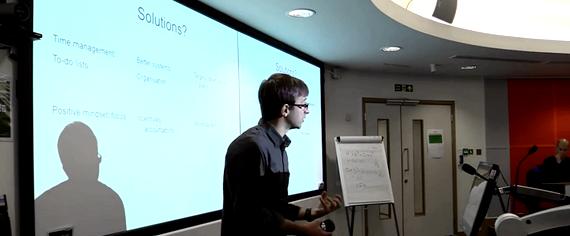


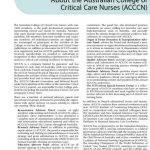 Anne sylvie ramelet thesis writing
Anne sylvie ramelet thesis writing Caution thesis writing in progress phd comics coffee
Caution thesis writing in progress phd comics coffee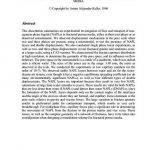 Dissertation proposal sample finance thesis
Dissertation proposal sample finance thesis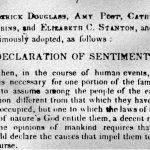 Declaration of sentiments and resolutions thesis proposal
Declaration of sentiments and resolutions thesis proposal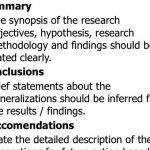 Chapter 5 thesis introduction writing
Chapter 5 thesis introduction writing






